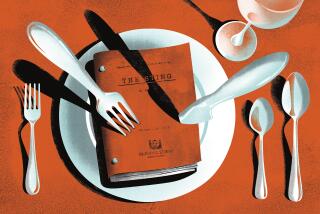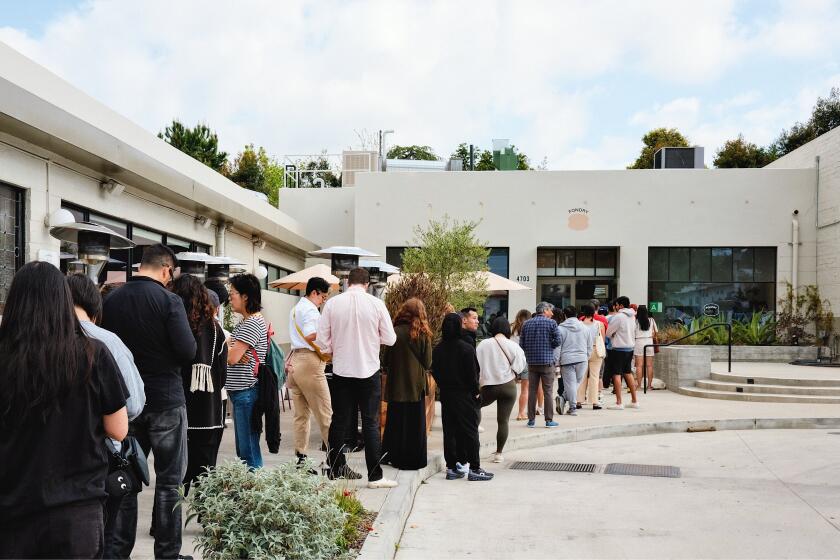Edith Bunker as Julia Child Bakes an Operatic Cake
It was very confusing.
The lady on the stage sounded, after a fashion, like Julia Child. The prima donna of home-made haute cuisine was all aflutter about the proper preparation of a chocolate cake.
” Gateau au chocolat--l’eminence brune ,” she proclaimed with a nasal flourish. Her grandiose gesture nearly dislodged the dish towel elegantly suspended from her waistband.
The very thought of all that dark caloric goo in the oven caused her to yodel grace notes. This, she promised, would be a “ very special, very chocolaty, bittersweet love ly cake.”
“Chocolate is much more complicated than any of us suspects,” she confided with a little bel-canto coo.
“When you’re going to do a cake,” she added in a melismatic purr, “you really have to have a battle plan.”
The plan, it turned out, included a few untidy but practical turns.
“Knock out the flour on the floor if you have a self-cleaning kitchen like mine,” the televisionary culinary auteur advised. Her nonchalance flirted with mock-Wagnerian fervor.
But wait.
The lady didn’t really look like Julia Child. This was an imposter.
She looked more like the deceptively scatterbrained Edith Bunker. She even sounded a bit like Edith Bunker. After all, she was singing.
She wasn’t shrieking the Leitmotivic fioriture of “Those Were the Days.” Admittedly, there were no ascending allusions to “Gee, our old LaSalle ran great.” Still, she mustered a good deal of giddy parlando, a decent degree of soupy Sprechgesang .
Why was the most adorable of dingbats making music, after her fashion, and in this disguise? Why was she concocting a confection that Archie would spurn in favor of a Twinkie? What was she doing with all those bowls and pots and pans, and, by the way, why were the utensils invisible?
The answer was easy. This was opera.
Well, OK, it was mimed semi-opera. Hemidemisemiquavering opera.
The occasion, a benefit for the opera department at Cal State Long Beach, was part of an ongoing festival celebrating the works of Lee Hoiby. The stubbornly neo-Menottian composer had cooked up this musical Child’s play as a vehicle for Jean Stapleton.
In 1984, she had performed the premiere of Hoiby’s “The Italian Lesson,” a scena based on a once-popular monologue by the late Ruth Draper. Now, for an encore that could function as a curtain raiser, Hoiby had turned to the high priestess of the eggbeater.
With her blessing and cooperation, he set an actual 1961 telecast to music. The recipe transcript served as instant libretto.
One suspects that Child’s proud gateau rises higher than Hoiby’s modest opera. “Bon Appetit!” gurgles and simmers amiably and aimlessly for about 20 minutes. Then it stops, abruptly and cheerfully. “That’s all for today.”
The rambling vocal line is eminently conversational, the affect cute, the impact slight. The churning accompaniment, intended for a chamber ensemble but reduced here to a piano, affords neat punctuation and a few in-joke quotations.
Ultimately, this is an exercise in innocent merriment. It offers little ado about little.
One might say the same for “The Italian Lesson,” which ended the mercifully short evening. Here, Hoiby rolls out an innocuous musical blanket to provide sound effects, emotive signals and all-purpose accommodation for the protagonist’s busy sing-song.
The sing-song, affectionately acted and prettily costumed, reflects the flighty vicissitudes of a wealthy Manhattan matron as she gets dressed for someone’s funeral. We observe the dauntlessly mellifluous lady coping democratically with her Dante tutor, her squabbling kids, her absent husband, her gossipy friends on the phone, her beleaguered cook, her club duties, her secretary, her absent lover and her new puppy dog.
The words are cleverly crafted. So is the score.
Stapleton played both chef and socialite with affectionate bravado. Like all good singing actresses, she inflected the words thoughtfully. Although her arrival upon the scene need not cause much concern for Frederica von Stade or Marilyn Horne, her small and wiry mezzo-soprano passed this rather strenuous test honorably. She is no hog-coloratura.
Hoiby served Hoiby--and Stapleton--sympathetically at the upstage keyboard.
The overflow audience at the University Theatre (capacity 400) registered push-button approval at the slightest hint of a verbal or vocal glissando.
More to Read
Eat your way across L.A.
Get our weekly Tasting Notes newsletter for reviews, news and more.
You may occasionally receive promotional content from the Los Angeles Times.






